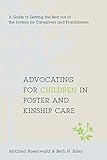Advocating for Children in Foster and Kinship Care : A Guide to Getting the Best out of the System for Caregivers and Practitioners / Beth Riley, Mitchell Rosenwald.
Material type: TextPublisher: New York, NY : Columbia University Press, [2010]Copyright date: ©2010Description: 1 online resource (272 p.) : 42 tablesContent type:
TextPublisher: New York, NY : Columbia University Press, [2010]Copyright date: ©2010Description: 1 online resource (272 p.) : 42 tablesContent type: - 9780231146876
- 9780231519359
- Child welfare -- United States
- Foster children -- Legal status, laws, etc -- United States
- Foster children -- Legal status, laws, etc. -- United States
- Foster children -- Services for -- United States
- Foster children -- Services for -- United States
- Foster home care -- United States
- Foster parents -- Services for -- United States
- LAW / Family Law / Children
- 362.73/3 22
- HV881 .R675 2010
- online - DeGruyter
- Issued also in print.
| Item type | Current library | Call number | URL | Status | Notes | Barcode | |
|---|---|---|---|---|---|---|---|
 eBook
eBook
|
Biblioteca "Angelicum" Pont. Univ. S.Tommaso d'Aquino Nuvola online | online - DeGruyter (Browse shelf(Opens below)) | Online access | Not for loan (Accesso limitato) | Accesso per gli utenti autorizzati / Access for authorized users | (dgr)9780231519359 |
Frontmatter -- Contents -- Foreword -- Preface -- Acknowledgments -- Part I. Preparing for Advocacy -- 1. In the Beginning -- 2. Knowing Limits -- Part II. Advocacy with Service Providers -- 3. Advocating Within the Social Services System -- 4. Advocating Within the Family Court System -- 5. Advocating Within the School System -- 6. Advocating Within the Health and Mental Health Systems -- 7. Advocacy in Interdisciplinary Teams -- Part III. Advocacy for Change in Agency Policy, Law, and Communities -- 8. Advocating for Agency Policy Change -- 9. Advocating Legislatively -- 10. Advocating in Communities -- References -- Index
restricted access online access with authorization star
http://purl.org/coar/access_right/c_16ec
This book is the first to provide strategies for effective advocacy and placement within the foster care and kinship care systems. It also takes a rare look at the dynamics of the foster and kinship relationship, not just among children and the agency workers and service providers who intervene on their behalf, but also between children and those who take in and care for them as permanency develops. Drawing on their experience interacting with and writing about the institution of foster care, Mitchell Rosenwald and Beth N. Riley have composed a unique text that helps practitioners, foster parents, and relative caregivers realize successful transitions for youth, especially considering the traumas these children may suffer both before and after placement.Advocating for a child's best interests must begin early and remain consistent throughout assignment and adjustment. For practitioners, Rosenwald and Riley emphasize the best techniques for assessing a family's capabilities and for guiding families through the challenges of foster care. Part one details the steps potential foster parents and kinship caregivers must take, with the assistance of practitioners, to prepare themselves for placement. Part two describes tactics for successful advocacy within the court system, social service agencies, schools, and the medical and mental health establishments. Part three describes how to lobby for change at the agency and legislative levels, as well as within a given community. The authors illustrate recommendations through real-life scenarios and devote an entire chapter to brokering positive partnerships among practitioners, families, and other teams working to protect and transition children.
Issued also in print.
Mode of access: Internet via World Wide Web.
In English.
Description based on online resource; title from PDF title page (publisher's Web site, viewed 02. Mrz 2022)


